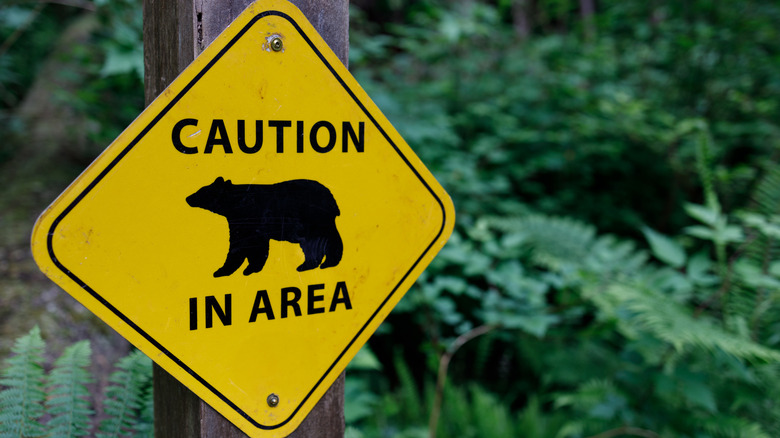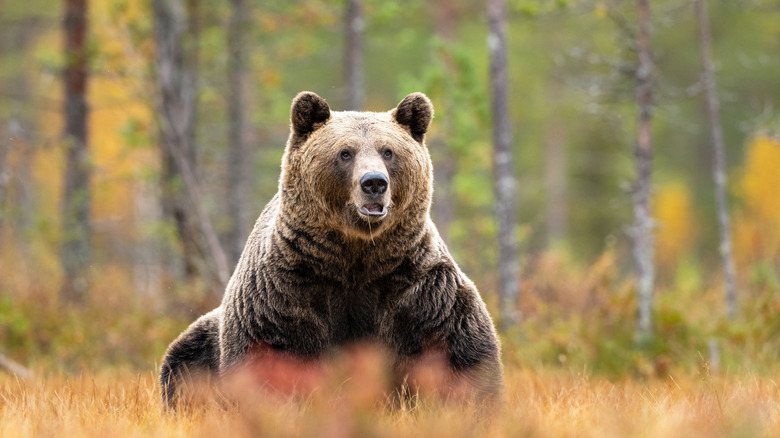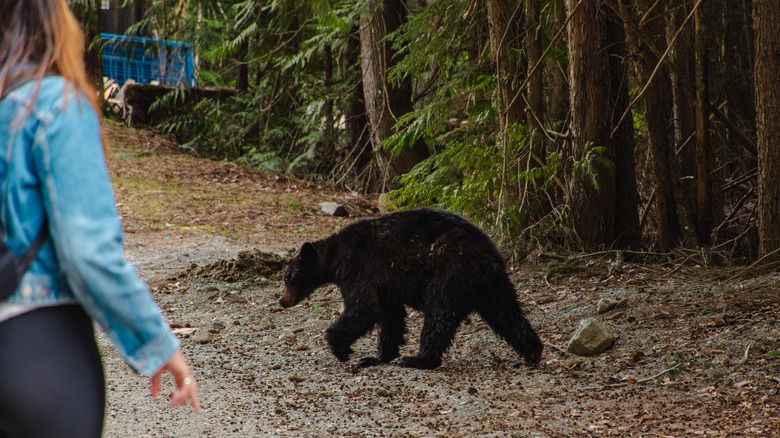Learn This Simple, Life-Saving Poem To Protect Yourself When Camping In Bear Country
While camping in North America offers its own self-evident rewards — such as soaking up the splendors of this mountain playground park in Alberta's Rockies — it also comes with built-in risks. Weather can change on the spin of a dime, bringing sudden thunderstorms, blizzards, flash floods, or even wildfires. Uneven paths can cause twisted ankles and broken legs, and soaring summer temperatures can lead to dehydration and even heatstroke.
While we often head to nature to experience wildlife, it can also ruin a camping trip. Mice and other rodents can chew their way through your tent, backpack and food stash, bats and raccoons can give you rabies, and a strike from a started rattlesnake is a guaranteed trip to the E.R. And then there are bears. No other animal represents the power and untamed nature of the North American wilderness than the bear. They range from the mountains of Mexico to the North Pole, and if you spend enough time in the backcountry, you're almost sure to come across one.
While most bears tend to flee at the first sight (or scent) of a human, they do — on rare occasions — attack. So, if you find yourself in a close encounter with a bear in the remote wilderness, this poem is worth memorizing to keep you safe: "If it's brown, lie down. If it's black, fight back. If it's white, say goodnight."
Know the difference between bears
Brown bears — including grizzly bears, which are considered a subspecies — are found throughout America's least-visited state of Alaska, western Canada, Montana, Wyoming, and the northernmost reaches of the Pacific Northwest. You can identify them by their round ears, long snout, and signature hump over the shoulders. These massive creatures weigh up to 1,500 pounds and are considered the ultimate apex predator. If attacked, your best bet is to lie down, as the poem suggests. Play dead while covering your head and neck, as fighting back will likely worsen an already bad situation.
Black bears are the most common species, and luckily the smallest and least aggressive. That said, on very rare occasions, they have been know to go after humans, and in that case, you should fight back. Punching or kicking the bear's face can be effective, especially employing rocks, sticks, or anything that can be used as a weapon. Go for the eyes, snout, and ears, as these are the most sensitive areas. A couple of good strikes may just give you a fighting chance, though your best bet to deter any aggressive bear — regardles of species — is a good can of bear spray.
However, when it comes to polar bears, there is no effective strategy for warding off an attack, though you are advised to never play dead and, instead, fight back. These gargantuan beasts wander the frozen reaches of the north in search of food. Humans — like any other animal — are definitely on the menu. If a polar bear comes after you, it probably intends to eat you. This means any time you enter into polar bear habitat, you should be prepared to ward the bears off, which may mean surrounding your camp with a portable electric fence, and definitely carrying a high-caliber firearm.
How to avoid a bad encounter with a bear
Bears are a fact of life when camping or hiking in much of North America, but there are ways to minimize the likelihood of getting attacked. Traveling in groups is the best way to deter any bear in the area, and be sure to make plenty of noise if you're in bear country. Sing songs and periodically yell out to alert any bears in the area of your presence.
Securing your food while camping is essential. This also includes soap, toothpaste, cosmetics, scraps, bug repellent, and anything else with a strong scent that may attract a bear. Utilize any bear-proof lockers that may be provided by the campground and if you're in the backcountry, a bear canister is a must. If you find yourself without one, put your food into a nylon bag (a sleeping bag stuff sack usually works best) and string it up over a tree limb at least 15 feet off the ground. The hanging spot should be at least 10 feet away from the trunk and 200 feet away from your tent.
More than anything, awareness is key when you're in bear country. Always be on the lookout for signs — tracks, droppings, claw marks on trees — and know which species may inhabit the area. It also pays to know what kind of habitat bears prefer, such as thickets, boulder fields, dense forest, and anywhere berries are ripening. The worst thing you can do is surprise a bear, so always proceed with plenty of caution when you're in their neighborhood. However, bears don't just live in North America; it's important to be hyper vigilant when camping and hiking in certain parts of Europe such as Romania, where bear attacks are epidemic.


